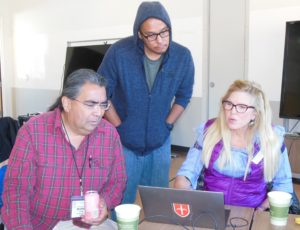
Water and air quality data. Fisheries and wildlife data. Natural resource and land management data. Tribes collect large amounts of data, and with more of it accessible each day via the Exchange Network and other web-based data services, there is a strong desire among tribal staff to learn the skills necessary to manage that data on their terms.
The Tribal Environmental Data & Technology Academy, or TribalDATA, was held November 5-7, 2019 on the Northern Arizona University campus. It was developed by the Exchange Network’s Tribal Governance Group (TGG) and the Institute for Tribal Environmental Professionals (ITEP) in response to a recent assessment of tribal environmental data management concerns and needs. The goal was to better equip attendees to harness the power of data to inform their programs and help enhance their environmental protection capacity. Throughout the event, new skills were developed, datasets explored, and knowledge gained.
Forty tribal professionals attended the event and more than a dozen additional professionals, tribal and otherwise, provided mentoring and support. The Academy attendees chose between workshops on readily available technology solutions such as GIS maps, database systems, and open-source tools such as R and OpenRefine. After the workshops concluded, attendees had the opportunity to connect with each other as well as with invited NAU students and staff during an open forum session. This format allowed attendees to build relationships with, and learn from, each other, and proved to be an important element of the overall event.
The interactive learning approach and opportunities for mentoring and information-sharing resulted in the majority of attendees coming away with a better overall understanding of the topics presented and new professional connections to help them accomplish their environmental data management objectives. Attendees gained confidence from witnessing how others deal with the challenges of data management, and from seeing how technology can help them answer questions about their data and make better sense of the data they collect.
Feedback from the attendees generally echoed the sentiments shared by these commenters:
- It was a very good workshop. I hope we have another to build off of what we have learned.
- Workshops should be longer – three days instead of two.
- I would not mind an additional day of hands on training. So useful!
- It was useful to have it set up with workshops and time for discussions and working with their own data.
The feedback received along with the reactions observed during the event indicate that tribes found the event useful and want additional exposure to the topics presented, as well as to the peers, mentors, and other professionals that can support them. With this evidence in hand, the TGG and ITEP plan to host more events for tribes and maintain a focus on building the fundamental skills and technical understanding important to further support tribal sovereignty and informed environmental decision-making.
For more information about the event, or the Exchange Network’s Tribal Governance Group, please visit www.tribalexchangenetwork.org.
